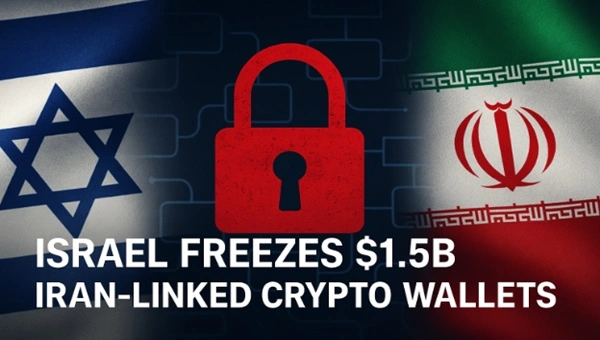

Tensions, Sanctions, and Stablecoins
Tensions between Israel and Iran have simmered for years, amplified by proxy wars and nuclear standoffs. Sanctions have severed Iran’s economic ties, forcing it to rely on alternative methods, such as cryptocurrencies, for transferring funds.
Stablecoins, designed for stable value, have become a go-to tool here, enabling quick transfers without the delays associated with traditional wires.
In the broader market, stablecoin issuance hit $160 billion this year alone, a sharp rise from pre-2020 levels, as nations under pressure seek workarounds.

Israel’s National Bureau for Counter Terror Financing acted on September 13, invoking anti-terrorism statutes to target the wallets mostly active on the Tron network. These addresses absorbed $1.5 billion in USDT over the prior year, though current balances hover around $1.5 million after swift blacklisting by Tether. The move stemmed from months of monitoring, where patterns emerged linking inflows to Iranian exchanges and outflows to military suppliers.
The IRGC, Iran’s elite force, channels these resources into drone manufacturing and support for allies like Hezbollah and the Houthis. Blockchain sleuths spotted connections to Nobitex, Iran’s top crypto hub, which funneled billions despite U.S. blacklists. This setup stands in stark contrast to compliant exchanges in Singapore or Dubai, where automated checks block high-risk transactions upfront.
The wallets intersect with known figures, such as intermediaries shipping tech to Yemen’s rebels. Funds cycled through layers, blending with legitimate trades to mask origins. This echoes U.S. actions in late 2024, when officials disrupted $300 million in IRGC-backed stablecoin routes to the Houthis.
Closer to home, a September 2025 U.S. forfeiture of $600,000 in USDT from an Iranian drone parts dealer underscores the trend.
Domestically, Israel linked similar crypto payments to spy rings busted this summer, where operatives got $500 stipends per mission. Such digital trails outpace the clunky hawala systems of past decades, offering speed but leaving permanent records for analysts to dissect.
Tech Behind the Trace
Success hinged on forensic tools that dissect public blockchains, clustering addresses by behavior. Tron’s efficiency drew the funds, yet its openness betrayed them. Tether’s role proved crucial, freezing 39 addresses on request, a practice ramped up since 2021 to align with enforcers worldwide.
This parallels the 2022 recovery of $3.6 billion in stolen Bitcoin, but shifts focus from hackers to state actors. Where cyber thieves launder through mixers, IRGC operatives favored volume over stealth, betting on overload. Global freezes by Tether now top $1 billion, signaling a maturing enforcement ecosystem.
Crypto exchanges worldwide now scramble to vet addresses, fearing secondary sanctions. Iran’s sector, cornered by restrictions, leans on local platforms like Nobitex, which clocked $11 billion in 2024 trades. A June 2025 breach there, where hackers siphoned $90 million to pro-Israel causes, exposed frailties, contrasting with fortified Western hubs.
Stablecoins face a reckoning. Europe’s MiCA rules, effective this year, mandate transparency from issuers, while U.S. bills target unhosted wallets. If Iran pivots to mixers or privacy tokens, detection grows harder, mirroring North Korea’s evasion tactics post-2017 hacks.
Echoes in Ongoing Conflicts
With Israel countering IRGC drone waves in Gaza and Lebanon, money routes turn into weapons. Crypto’s part recalls 2023, when token flows funded proxies and bought gear under blockade. Russia’s embrace of mining after Ukraine sanctions mirrors the playbook—using digital rails to bypass SWIFT and other limits.
These moves challenge claims of blockchain neutrality, tying networks directly to the battlefield.
Markets responded calmly: USDT held firm, though Middle East risk indices climbed 2%. For traders, the disruption is becoming routine, like Ukraine’s war shocks in 2022. The seizure lays bare crypto’s contradiction; freedom for the sidelined, danger for the sanctioned. Regulatory pressure grows, but so do the shadow channels it provokes.
He has worked with several companies in the past including Economy Watch, and Milkroad. Finds writing for BitEdge highly satisfying as he gets an opportunity to share his knowledge with a broad community of gamblers.
Nationality
Kenyan
Lives In
Cape Town
University
Kenyatta University and USIU
Degree
Economics, Finance and Journalism


Facts Checked by Vlad Hategan

 Fact checked by
Fact checked by 
 eabungana@gmail.com
eabungana@gmail.com 